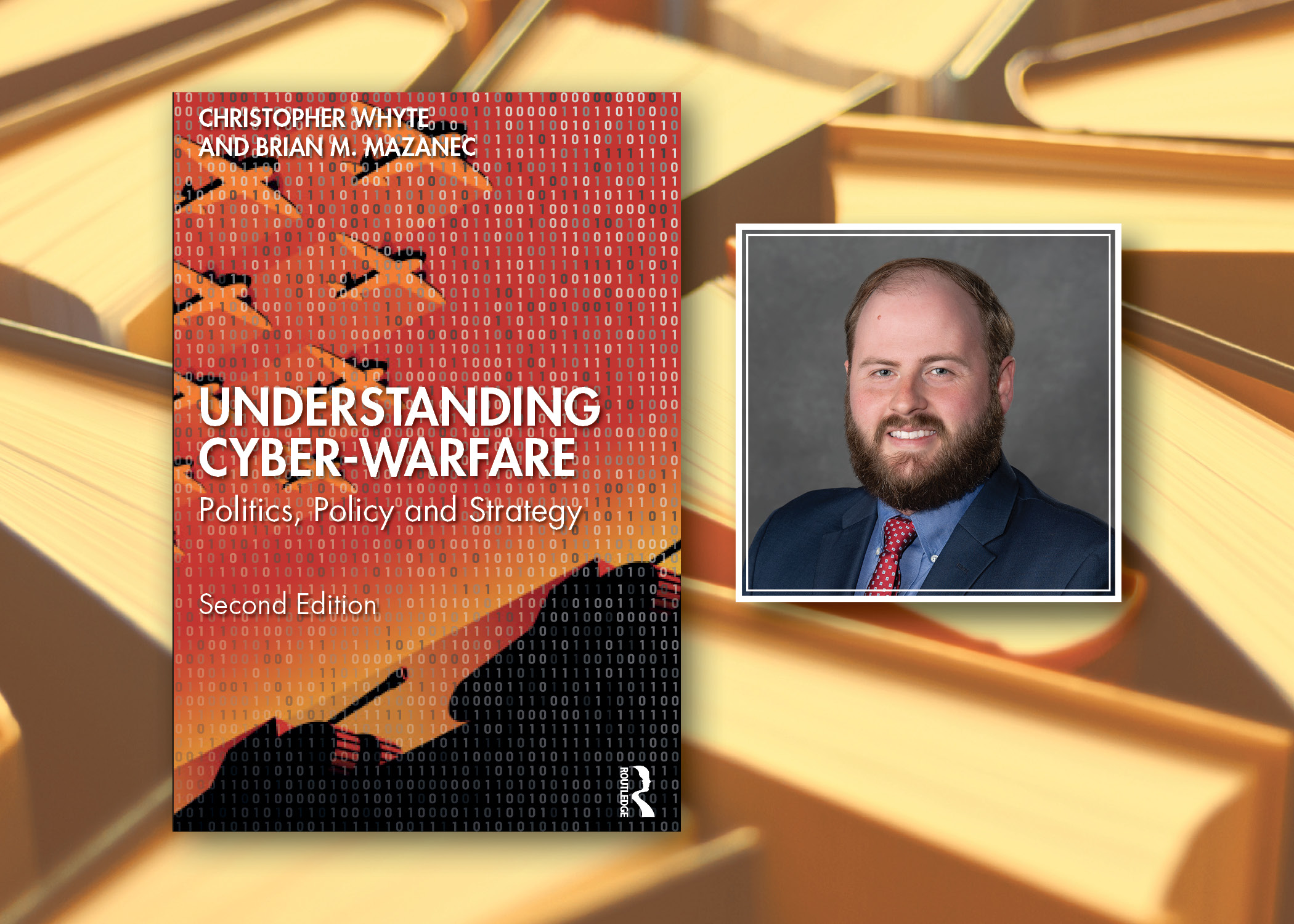News
Understanding Cyber Warfare: An Interview with Author and Cybersecurity Expert, Christopher Whyte

May 1, 2023
Christopher Whyte, an assistant professor of homeland security and emergency preparedness at the L. Douglas Wilder School of Government and Public Affairs at Virginia Commonwealth University, has recently released the second edition of his acclaimed book, "Understanding Cyber Warfare: Politics, Policy and Strategy." Originally co-authored in 2018, with senior government national security director and cyber conflict expert, Brian M. Manzanec, the book offers a unique blend of history, geo-strategic analysis, traditional course resources and in-depth case analyses that help readers gain a comprehensive understanding of the complexities of cyber warfare. The second edition, which is now available, features new content that builds on the book's original purpose, including the rise of artificial intelligence. It has received endorsements from retired former director of both the NSA and Central Intelligence Agency (CIA), General Michael Hayden, and former Director of National Intelligence, James Clapper.
Whyte is also the co-author of the recent book, "Information in War: Military Innovation, Battle Networks, and the Future of Artificial Intelligence," which delves into the challenges faced by AI and information technologies that lack institutional support and champions who can explain their potential to enable new forms of warfare. Heralded by the esteemed British historian Sir Lawrence Freedman in the latest edition of Foreign Affairs, “Information War” is available from Georgetown University Press.
In this Q&A, we sat down with Dr. Whyte to discuss the second edition of UCW and the current state of cybersecurity. He dispels common misconceptions about cyber warfare and highlights the new content that extends the book's purpose. Whyte also explains how the book can benefit a lay audience and supplement classroom instruction for both undergraduate and graduate students. Additionally, he provides valuable insights into the careers emerging in cybersecurity and the unprecedented opportunities they create for students.
Q: What's the biggest misconception/misinformation about cyber warfare that this book seeks to address?
Whyte: The biggest misconception about cyber warfare that this book corrects is the idea that cyber conflict is actually about warfighting or military action. While most cyber insecurity is criminal, it's true that the most calamitous events are indeed political ones. Those are the incidents, the attacks that cause the most consternation. But fears about cyber doom or "Cyber Pearl Harbor" really are the stuff of mass hysteria. Most cyber conflict is espionage, subversion, sabotage, or information operations that augment military potential, but don't impact the battlefield.
Q: Why is now the time for an update? Can you share more about the new content that extends the purpose of a new addition?
Whyte: In a fast-moving and evolving field like cyber conflict studies, research is often obsolete not long after it comes out. The first edition of UCW was a top-selling text with few peers that discussed the history, politics and strategy of operation in cyberspace for students and professionals of all kinds. The new edition builds on this for a field that has changed much in just a few years. We add substantial new data to illustrate the rise of national cyber forces over just the last decade. We also show the shifting character of cyber campaigns in recent years, which have substantially featured the use of proxy actors like cybercrime gangs and patriotic hackers in place of known national institutions. And we engage with the context of the early war in Ukraine. Part of that discussion is additional history on the shift towards subversive uses of cyberspace in the 2010s, particularly following Russia’s attack on Crimea in 2014. Finally, we provide a new framework for thinking about emerging technologies that will shape cyberspace and society --- artificial intelligence and quantum computing among them.
Most cyber conflict is espionage, subversion, sabotage, or information operations that augment military potential, but don't impact the battlefield.
-Christopher Whyte
Q: Is this something lay audiences can benefit from? If so, how will this knowledge impact them?
Whyte: This book is as accessible for a lay audience as it is for students and advanced learners. In UCW, you'll find history and stories about the evolution of cybersecurity, clear visualization of trends and provocative thought exercises that all aim to bridge the gap between reality and perceptions of overly-technical subject matter to build a more digitally-literate citizenry.
Q: How does this text supplement your classroom instruction and how our students learn from your expertise?
My graduate students and undergraduate learners both engage with UCW in different ways. They read excerpts or full sections, but also get the interactive version of the experience in my classes. For undergraduates, this means mini-games, thought exercises and simulations that amount to experiencing the content arrayed in UCW, while my graduate students are provisioned with interactive versions of the data used in UCW and take part in multi-week war games.
Q: Can you discuss the careers emerging in cyber fields and how these new roles create unprecedented opportunities for students? (This is more tangential from the book but an important question!)
Careers in cybersecurity are far less emerging than the layperson probably thinks. Likewise, they are only technical some of the time. From policy analysts to compliance experts and intelligence operators, cybersecurity jobs are available that pay well for those without computer science or IT backgrounds. In fact, those jobs are often underfilled, largely because students fear technological topics. UCW and my classes show students that cyber conflict and cybersecurity is as much politics, strategy, sociology and history as it is technical expertise.